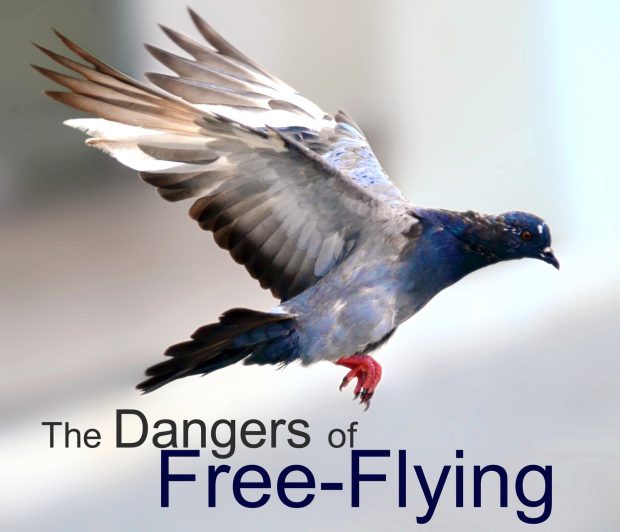Why Is It Dangerous for Pet Pigeons to Free Fly?

All birds should be hatched wild and live and fly free but unfortunately many don’t. Whether they are our pets because they are domestic or because they are rescued from the wild, they can’t free fly safely. We would break your heart with all the stories of pet birds lost. And how they suffer.
The biggest risk to a pet pigeon or dove is getting outside and being killed by a predator before he can get back in to safety. Wild pigeons derive all their security from being part of a flock that stays alert watching out for predators and knows what to do (and has the education and physiology to do) what is needed when under attack. A pigeon alone is extremely vulnerable. A domestic pigeon outside alone is in imminent danger. It is unsafe to take a pet pigeon outside unprotected. They need to be in an aviary or in the house.
Your pet pigeon or dove doesn’t want to get lost but many do, especially when allowed to hang around outside in the backyard or ride along unprotected on their person’s shoulder. And clipped wings do not protect birds outside. Birds are by their very nature aerodynamic and being outside unprotected with clipped wings is no safer. One little startle and, with the air currents outdoors, they are airborne. And in danger. Wild pigeons and doves derive all of their security from their survival of the fittest DNA, their education growing up in the wild and from being a part of a flock. Your pet pigeon, even if hatched wild, is at terrible risk if permitted to free fly. You (and your dogs and your patio cover, etc. etc.) offer no protection to pet birds, only an illusion of safety. We too wish your pet could fly free but the odds of tragedy are very high. It is just too great a risk.
Reprinted from the Palomacy Help Group, written by Ashley Dietrich
We’re discussing free-flying pet pigeons, and why not to do it.
It sounds great, right? These fantastic fliers, out in the fresh air, doing what nature intended? It sounds wonderful, and I wish I could give my birds the whole sky to enjoy. While pigeons and doves DO need exercise and sunlight, these needs can be met with a predator-proof aviary, out-of-cage time indoors, secure leashes, etc. Here are the reasons Palomacy advocates against allowing domestic birds outdoors un-caged/un-tethered:
1. Predators
— Hawks – they’re everywhere. I’ve read a report about a hawk grabbing a parrot off of an owner’s shoulder. Raptors focus tightly on their intended prey, swoop in, and won’t always notice or care if a human is nearby. Two years ago, a small hawk tried to get my dove Cecily as she sat inside the screen of my open window, sunning after a bath – I was sitting less than 3 feet away. My windows are now covered in hardware cloth in addition to the basic window screens, so it is safe to open the glass. I live in the woods, but hawks are city birds too.
— Cats and Dogs. Even with the benefit of wild instincts, countless birds fall victim to outdoor cats and dogs. Cat attacks are the #1 human-related cause of bird mortality. I’ve seen this first-hand too many times as a wildlife rehabber, and I’ll spare you the gory details.
2. Birds can get lost
Birds are more difficult to retrieve than 4-legged pets. It’s easy for something to spook a bird – if they go too high or too far, it can be even harder to get them back. They can cover more distance, quickly – and a bit of wind exacerbates this problem. The tamest of birds could bolt if startled, and not all pigeons have a homing instinct. Adding to the complications, many people do not realize they are pets, so birds are less likely to get help from strangers. The pigeons and doves I have retrieved after they were found outdoors have all been suffering from dehydration or hunger to some degree. They cannot find food and water in the wild.
Learn more about how to care for your pet pigeon here. See pigeon pants and how to safely use them when taking your bird outside here.
